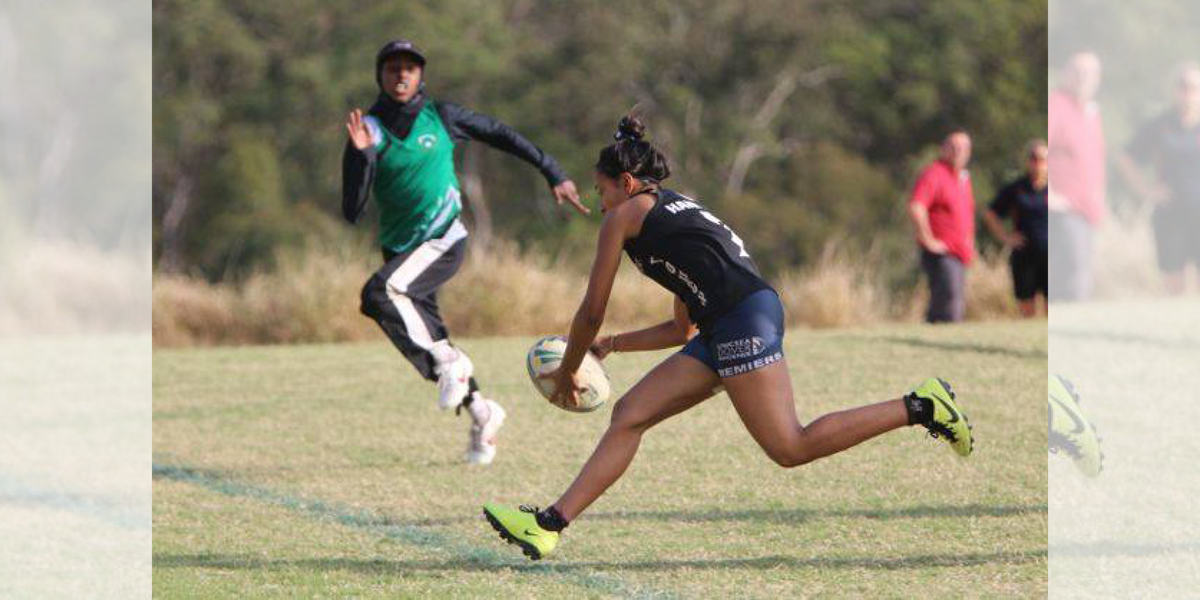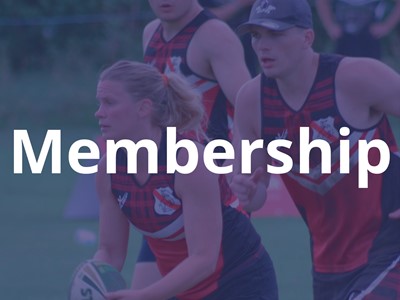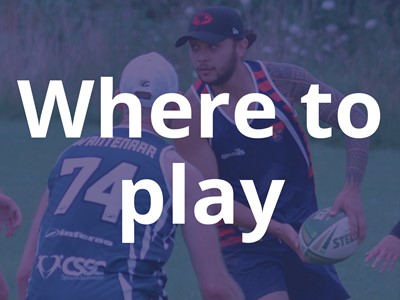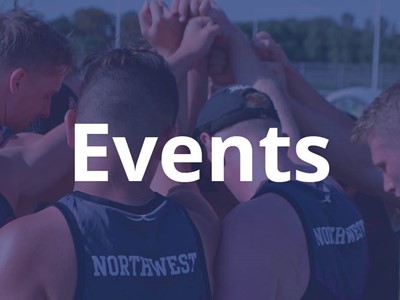Sign-up to receive all the latest news from England Touch
Ramadan, Fasting and Elite Athletes - a conversation with England High Performance athletes

By ETA High Performance Athletes and EDI Working Group members Haniyyah Rahman-Shepherd and Niki Bird
Over the past few weeks, Muslims around the world have been observing Ramadan. Haniyyah Rahman-Shepherd is amember of the England Touch High Performance Pathway and as such, has to balance the demands of training and playing whilefasting, as part of her faith.
Haniyyah grew up in Singapore, as did England international Niki Bird. While they come from the same city and even went to the same school, they did not cross paths until Haniyyah joined the Galaxy London club and later SETA’s Taipans team in 2017 – where Niki remains a fierce captain.
Since then, Haniyyah and Niki have bonded as teammates and as members of the Equality, Diversity & Inclusion (EDI) Working Group. They regularly blur the lines between the two, discussing a wide range of challenges in the sport from gender equality on the pitch, ageism, and socio-economic barriers to the sport.
In early May, they got together to talk about how Haniyyah, as both a Muslim and high-performance athlete, navigates Ramadan. Read the first part of their interview below.
[Niki]: For those that aren’t fully aware of what Ramadan is and what it means, could you give us a quick overview?
[Haniyyah]: Ramadan is a month in the Islamic lunar calendar. It is 30 days during which Muslims fast. This means we do not drink or eat anything from sunrise until sunset each day. Ramadan encourages greater spirituality and calls on Muslims to practice key values such as empathy, charitability, patience, and discipline. Fasting every day really helps teach these values. You build awareness of how often we instantaneously feed every single one of our desires. I try to see it as nourishing my soul when I can’t nourish my body.
[Niki]: So as part of that charitability, I know it’s common to invite people to your home to partake in the evening meal – when you break your fast. That meal is called iftar is that right?
[Haniyyah]: Yes, so the evening meal when you break your fast is called iftar. The morning sunrise meal is called suhooror sehri. For iftar, it’s tradition to break your fast with a date and water but typically – and depending on your culture or where you come from – you have a bunch of other snacks to eat too, before you go on to have a full dinner.
[Niki]: I would love to know when you first started fasting for Ramadan?
[Haniyyah]: Ramadan becomes obligatory once you hit puberty. A classic worldwide rite of passage. Before that, you join in on weekends or just a few days a week so it’s a gradual transition to a full month. But there were plenty of times as a young teen where my mental resolve was weakened by the canteen cinnamon buns. It is definitely easier to start in a family structure because you have that support, everyone’s doing it together, and you can get several years under your belt of figuring out what works best for you.
[Niki]: I can imagine. You've been a high performance athlete for a few years now, both in the Touch France and England Touch set up. Do you still train and compete as normal, whilst fasting?
[Haniyyah]: I pretty much take the attitude of doing everything as normal until I can’t, which I think comes naturally to most competitive athletes. You always want to do everything until coach physically pulls you out. It definitely takes a bit of bravery and mental resolve. But I’ve been doing it for so many years now, I’ve built it as a habit. As a kid when you're fasting and your mates are all at training, you put your boots on come rain or shine and you don't really think twice about it. Now as an adult whilst I work my 9-5 job and it's cold and dark outside, those childhood memories remind me that I am capable. We look for excuses all the time – it’s too cold, I’m too sore – and even more so in Ramadan, but it’s just another test of your discipline and consistency. Though I’m not sure I’d jump at a full day NTS right now...
[Niki]: I was just about to ask, have you ever played in, or would you consider playing in, a tournament whilst fasting?
[Haniyyah]: I probably have but it depends a lot on what time of the day it is for me. If there was an NTS tomorrow, I’d sign up for the afternoon probably because the thing I’m most concerned about is burning out too early. As a competitor, I always want to play at my best. But whilst I'm fasting, the reality is that there is always a risk I could go too far, too fast, and then have to deal with low energy, hunger and thirst for the rest of a very long day.
[Niki]: And which of those feelings do you find the hardest to cope with?
[Haniyyah]: For me it’s not the hunger or the thirst, it's the drain on your energy. It's not the same feeling as when you're unfit and struggle to catch your breath. Every single action, no matter how small, hits me twice as hard and feels like it takes twice as long to recover.
[Niki]: It really highlights the importance of hydration, nutrition, and recovery for athletes. I'm sure many of us have experienced a bad day or a bad game when we have perhaps not fuelled or recovered adequately, but I can't imagine it comes close to what you have to endure. As a PT, when I think of you running around not having eaten or drank anything since sunrise, though I have huge respect for your dedication, I am also amazed that you can still turn up and perform at the level that you do. Not to mention your sleep patterns totally disrupted waking up for suhoor every day. I just wanted to highlight this, in the hopes that people have a better understanding and a bit more patience with fellow teammates and even friends, colleagues who are fasting.
[Haniyyah]: Yeah, it’s a bit of a catch because it’s not the point of Ramadan to draw attention to your suffering. On the one hand, as a Muslim, I don’t want special treatment. This is my choice and I feel empowered to fast and train. But on the other hand, as a teammate, I want my fellow teammates to be best prepared for the athlete that is showing up right now - just as you would cater for any teammate’s weaknesses or strengths. Part of team sports is knowing what your teammates can and can’t do, letting go where they can and compensating where they can’t. Sometimes I tell people I’m fasting to let them know that I physically can’t be the athlete I normally am. But I think it would go a long way if these things didn’t need to be said because there was already a greater awareness. Or even still, once they were said, if that communication really translated into empathy and flexibility on the pitch too. If you have teammates who are fasting, they probably can’t scoop off the back of every set or defend in the mids for back-to-back sets. I'd love to get to a place where it's not always me initiating those conversations, but instead open and joint communication, initiated by my coaches and teammates.
[Niki]: The way I look at it as a non-Muslim, I don’t think I see it as giving you special treatment at all. I think it's about the rest of us, applying a little more of what you practice during Ramadan in that, we could all be a little more empathetic and understanding of others. Something that can go a long way in our sport and being part of a team.
[Haniyyah]: Absolutely. And there are more and more people these days that want to learn and talk to me about Ramadan. I've even had people say they would join me for a day's fast in support. As an athlete that is regularly the only Muslim on my team, I really appreciate the gesture, spirit, and the openness to learn. But I think the most valuable thing for me, as you put it earlier, is if we can continue to mirror these Ramadan values of empathy, patience, and discipline both on and off the field, as part of our core team ethos and mentality.
Tomorrow (Sunday 9th) Haniyyah will be doing an Instagram take over via @GalaxyTouchLondon. Check out their stories for more of an insight to Ramadan and fasting whilst training.







